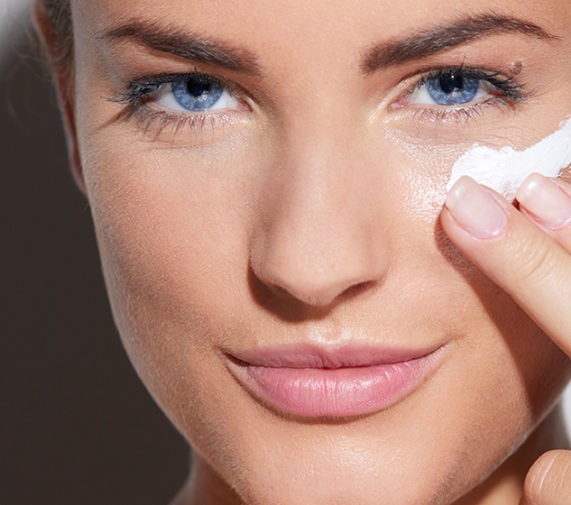When there’s a chill in the air, some people eagerly grab their chunky sweaters, order pumpkin spice lattes and cuddle up by the fireplace. But for those who suffer from dry winter skin, the onset of cold weather can mean a season of discomfort.
For skin to feel soft, the top layer must contain a minimum of 10% water and ideally between 20% and 35%, according to the Harvard Medical School website. Our bodies have sebaceous glands that produce sebum, an oily substance that protects our outer layer of skin—and if our skin doesn’t have enough of it, or cold weather overwhelms its ability to prevent water loss, dry skin is the uncomfortable and sometimes unsightly result.
Dry skin can have a host of symptoms beyond simple dryness. According to the American Association of Dermatology, these include:
- Rough, scaly or flaking skin.
- Itching.
- Gray, ashy skin in people with dark skin.
- Cracks in the skin, which may bleed if severe.
- Chapped or cracked lips.
In extreme cases, winter skin can lead to illness. When dry skin cracks, germs can enter the body. Once inside, those germs could cause an infection. Red, sore spots on the skin may be an early sign of an infection—and a reason to see a dermatologist.
Before you wring your (dry) hands over having winter skin, check for ways you may be unconsciously doing things to make matters worse. With some simple changes, you may be able to solve the seasonal skin problem yourself.
“If you live in cold temperatures, just turning on your central heating can make your skin drier,” says Dr. Nada Elbuluk, Assistant Professor at the University of Southern California Department of Dermatology and member of the American Academy of Dermatology. She recommends using a humidifier to add moisture to indoor air.
Another problem comes with showering. It may seem like a good way to warm up and hydrate your skin, but resist the urge to take a long, hot shower. “Keep your showers short,” Dr. Elbuluk explains. “The more exposure you have to hot water, the more drying it is. I recommend five to 10 minutes, max. And when you get out, pat yourself dry and then moisturize.” She recommends choosing creams with ceramides, humectants and glycerin instead of lotion, to properly hydrate dry skin. “Also make sure to wear sunscreen to protect your skin, as a sunburn will only irritate dry skin further.”
What you use in the shower or tub is also something to consider. While it may be tempting to try to rub off flaky, dry skin, resist that temptation. “One thing that people need to be careful of is using loofahs or harsher scrubs,” says Dr. Elbuluk. “That irritates the skin more.”
When air lacks humidity, bundling up in a warm, wool sweater may feel less cozy and more uncomfortable. “When air is stripped of humidity and skin becomes dry, some fabrics can feel itchy,” says Dr. Sony Kenkare, FAAD board-certified dermatologist in Chicago. “I think some people may be fine wearing wool, but if it bothers you, consider wearing layers. Put a natural fabric layer, like cotton or silk long underwear, next to your skin. Then you can put that wool sweater on top, and you won’t experience the itchy sensation as much.”
The internet is chock full of DIY recipes for dry skin treatments, some of which only require a quick trip to your kitchen for the ingredients. Before you try a home fix, take into consideration what kind of skin you have (other than dry). “I would say the DIY approach can work for some people whose skin is not allergy or eczema prone. But using olive oil or avocado oil could cause a breakout for some people, and others may have an allergic reaction.” Just because your skin is dry doesn’t necessarily mean you stop breaking out—and slathering your skin in coconut oil may lead to clogged pores if you have a problem with acne.
If you have eczema or sensitive as well as dry skin, remember to look for gentle skin care. “Use products that are non-fragrant and gentle soaps like Dove or CeraVe,” says Dr. Kenkare. “The beauty of these is that they’re oil-free and extra-sensitive.”
Here are some other easy ways to ward off dry skin:
- Wear gloves when cleaning to protect hands from solvents
- Carry moisturizer with you and apply after washing your hands
- Make sure your laundry detergent is unscented and hypoallergenic
Most of the time making some easy adjustments will help dry skin disappear, though don’t hesitate to make an appointment with your dermatologist if you need to. “If you have itching, burning or pain, that’s when you want to see a dermatologist,” advises Dr. Elbuluk. “But dry skin is fairly common. It’s not a red flag.”
twistup
Love OrangeTwist?
Join our twistup membership and receive a $100 gift card today!




